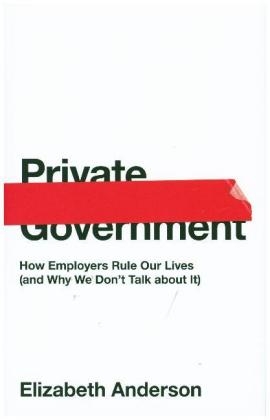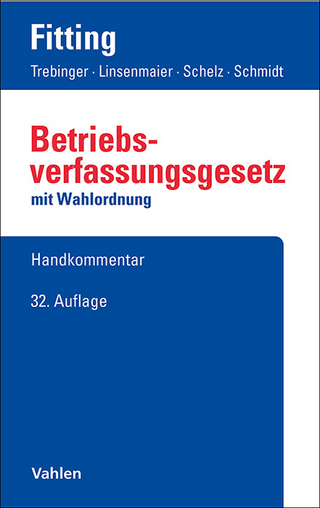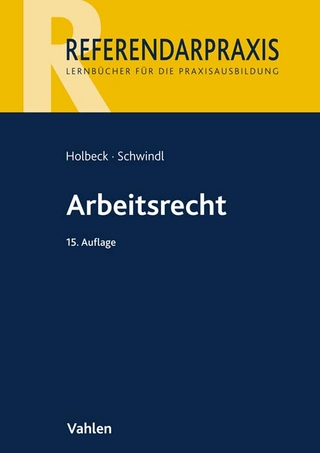
Private Government
How Employers Rule Our Lives (and Why We Don't Talk about It)
Seiten
2017
Princeton University Press (Verlag)
978-0-691-17651-2 (ISBN)
Princeton University Press (Verlag)
978-0-691-17651-2 (ISBN)
Why our workplaces are authoritarian private governments--and why we can't see it One in four American workers says their workplace is a "dictatorship." Yet that number probably would be even higher if we recognized most employers for what they are--private governments with sweeping authoritarian power over our lives, on duty and off. We normally
Why our workplaces are authoritarian private governments--and why we can't see it One in four American workers says their workplace is a "dictatorship." Yet that number probably would be even higher if we recognized most employers for what they are--private governments with sweeping authoritarian power over our lives, on duty and off. We normally think of government as something only the state does, yet many of us are governed far more--and far more obtrusively--by the private government of the workplace. In this provocative and compelling book, Elizabeth Anderson argues that the failure to see this stems from long-standing confusions. These confusions explain why, despite all evidence to the contrary, we still talk as if free markets make workers free--and why so many employers advocate less government even while they act as dictators in their businesses. In many workplaces, employers minutely regulate workers' speech, clothing, and manners, leaving them with little privacy and few other rights. And employers often extend their authority to workers' off-duty lives.
Workers can be fired for their political speech, recreational activities, diet, and almost anything else employers care to govern. Yet we continue to talk as if early advocates of market society--from John Locke and Adam Smith to Thomas Paine and Abraham Lincoln--were right when they argued that it would free workers from oppressive authorities. That dream was shattered by the Industrial Revolution, but the myth endures. Private Government offers a better way to talk about the workplace, opening up space for discovering how workers can enjoy real freedom. Based on the prestigious Tanner Lectures delivered at Princeton University's Center for Human Values, Private Government is edited and introduced by Stephen Macedo and includes commentary by cultural critic David Bromwich, economist Tyler Cowen, historian Ann Hughes, and philosopher Niko Kolodny.
Why our workplaces are authoritarian private governments--and why we can't see it One in four American workers says their workplace is a "dictatorship." Yet that number probably would be even higher if we recognized most employers for what they are--private governments with sweeping authoritarian power over our lives, on duty and off. We normally think of government as something only the state does, yet many of us are governed far more--and far more obtrusively--by the private government of the workplace. In this provocative and compelling book, Elizabeth Anderson argues that the failure to see this stems from long-standing confusions. These confusions explain why, despite all evidence to the contrary, we still talk as if free markets make workers free--and why so many employers advocate less government even while they act as dictators in their businesses. In many workplaces, employers minutely regulate workers' speech, clothing, and manners, leaving them with little privacy and few other rights. And employers often extend their authority to workers' off-duty lives.
Workers can be fired for their political speech, recreational activities, diet, and almost anything else employers care to govern. Yet we continue to talk as if early advocates of market society--from John Locke and Adam Smith to Thomas Paine and Abraham Lincoln--were right when they argued that it would free workers from oppressive authorities. That dream was shattered by the Industrial Revolution, but the myth endures. Private Government offers a better way to talk about the workplace, opening up space for discovering how workers can enjoy real freedom. Based on the prestigious Tanner Lectures delivered at Princeton University's Center for Human Values, Private Government is edited and introduced by Stephen Macedo and includes commentary by cultural critic David Bromwich, economist Tyler Cowen, historian Ann Hughes, and philosopher Niko Kolodny.
Elizabeth Anderson is Arthur F. Thurnau Professor and John Dewey Distinguished University Professor of Philosophy and Women's Studies at the University of Michigan. She is the author of The Imperative of Integration (Princeton) and Value in Ethics and Economics. She lives in Ann Arbor.
Introduction vii Stephen Macedo Author's Preface xix 1 When the Market Was "Left" 1 2 Private Government 37 3 Learning from the Levellers? Ann Hughes 75 4 Market Rationalization David Bromwich 89 5 Help Wanted: Subordinates Niko Kolodny 99 6 Work Isn't So Bad after All Tyler Cowen 108 7 Reply to Commentators Elizabeth Anderson 119 Notes 145 Contributors 183 Index 185
| Erscheinungsdatum | 25.05.2017 |
|---|---|
| Reihe/Serie | The University Center for Human Values Series |
| Verlagsort | New Jersey |
| Sprache | englisch |
| Maße | 140 x 216 mm |
| Gewicht | 397 g |
| Themenwelt | Geisteswissenschaften ► Philosophie |
| Recht / Steuern ► Arbeits- / Sozialrecht ► Arbeitsrecht | |
| Recht / Steuern ► EU / Internationales Recht | |
| Sozialwissenschaften ► Politik / Verwaltung ► Politische Theorie | |
| Wirtschaft ► Volkswirtschaftslehre ► Makroökonomie | |
| ISBN-10 | 0-691-17651-5 / 0691176515 |
| ISBN-13 | 978-0-691-17651-2 / 9780691176512 |
| Zustand | Neuware |
| Informationen gemäß Produktsicherheitsverordnung (GPSR) | |
| Haben Sie eine Frage zum Produkt? |
Mehr entdecken
aus dem Bereich
aus dem Bereich
mit Wahlordnung | Handkommentar
Buch | Hardcover (2024)
Franz Vahlen (Verlag)
95,00 €
mit den wichtigsten Bestimmungen zum Arbeitsverhältnis, …
Buch | Softcover (2024)
dtv Verlagsgesellschaft
13,90 €


